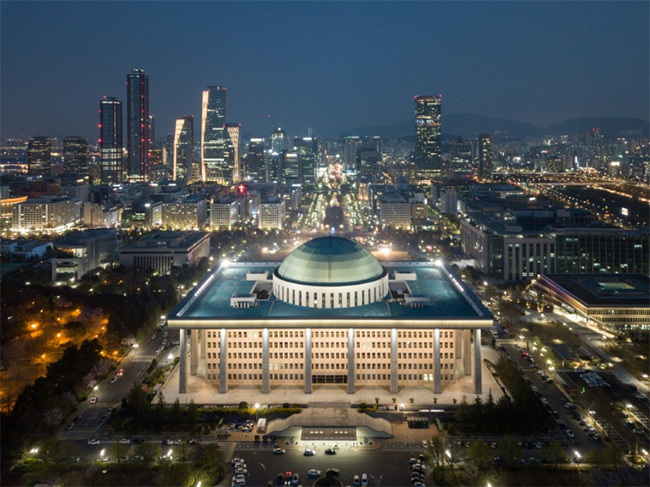South Korea ruling party wins parliamentary majority
Koreans' confidence in Moon's administration was boosted by his so-called "coronavirus diplomacy", such as recent bilateral phone calls with at least 20 state leaders, said Minseon Ku, a politics scholar at Ohio State University in the US.
COVID-19 | ELECTIONS
South Korea's left-leaning ruling party has won a landslide election victory, partial results showed Thursday, after the coronavirus pandemic turned the political tide in President Moon Jae-in's favour.
South Korea's left-leaning ruling party has won a landslide election victory, partial results showed Thursday, after the coronavirus pandemic turned the political tide in President Moon Jae-in's favour.
His Democratic party secured an absolute majority in the National Assembly, its first for 12 years, on a turnout of 66.2 percent -- the highest at a parliamentary election since 1992.
Just a few months ago Moon was threatened by scandals over power abuse and sluggish economic growth, while critics called his dovish approach towards North Korea unrealistic.
But the South's relatively quick and effective handling of the epidemic -- it has also exported test kits to at least 20 countries -- has been a boon for Moon and his party ahead of the polls, largely seen as a referendum on his performance.
Koreans' confidence in Moon's administration was boosted by his so-called "coronavirus diplomacy", such as recent bilateral phone calls with at least 20 state leaders, said Minseon Ku, a politics scholar at Ohio State University in the US.
She added that the president had successfully framed the pandemic as an "opportunity for South Korea to restructure its economy -- capitalising on industries like AI and biopharma".
This "coupled with South Korea's global recognition" for its handling of the outbreak sat well with voters, Ku said.
South Korea was among the first countries to hold a national election during the pandemic, with citizens still being asked to maintain social distancing after enduring one of the worst early outbreaks of COVID-19.
All voters were required to wear protective masks, clean their hands and don plastic gloves, and undergo temperature checks on arrival at the polling station.
Those found to have fevers cast their ballots in separate booths disinfected between each user.
Important momentum
South Korea uses a mix of first-past-the-post seats and proportional representation, and Moon's Democratic party had taken 163 constituencies in the 300-member National Assembly.
Its sister party was expected to win another 17 proportional representation seats -- due to be declared later Thursday -- for a total of 180.
The main conservative opposition United Future Party (UFP) and its satellite party were forecast to secure a total of 103 seats.
 South Korea is among the first countries to hold a national election during the pandemic. AFP / Ed JONES
South Korea is among the first countries to hold a national election during the pandemic. AFP / Ed JONES
Moon's position was not at issue as he is directly elected, but the absolute majority means he is likely to be less of a lame duck than previous presidents towards the end of their single five-year term.
"It should give his administration greater momentum," said Andrew Yeo, a politics professor at the Catholic University of America.
Former North Korean diplomat Thae Yong Ho, who defected in 2016 and stood for the conservative UFP, won in the wealthy Gangnam district in Seoul -- becoming the first former Northern official ever to be directly elected to the South's parliament.
Thae shed a tear as he sang South Korea's national anthem after his win was confirmed early Thursday.
But UFP heavyweights former prime minister Hwang Kyo-ahn and ex-parliamentary floor leader Na Kyung-won both failed to be re-elected.
The conservative party had "failed to rebrand" itself after the impeachment of former President Park Geun-hye, which "limited the boundary of support to older generations and core support regions", Ji Yeon Hong, a professor at Hong Kong University of Science and Technology, told AFP.
But while the pandemic took public attention away from the opposition's criticisms, it would be "dangerous" if Moon interprets the election as "vindicating foreign policies that aren't working", said Leif-Eric Easley, a professor at Ewha University in Seoul.
"Seoul's engagement of Pyongyang has been met with diplomatic insults and missile tests. Placating China has yielded little benefit," he said.
"Talking tough on Japan has not advanced South Korean interests. And progressives want to accelerate military command reforms and resist cost-sharing pressures in Seoul's alliance with Washington."